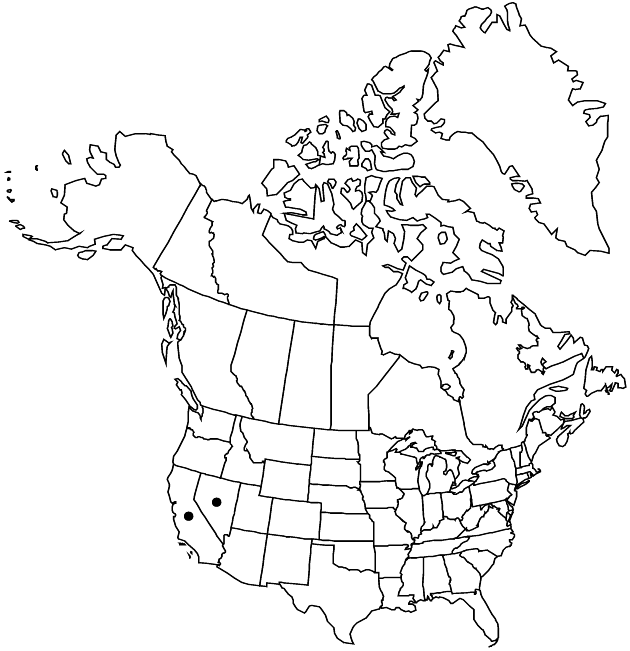Difference between revisions of "Erigeron multiceps"
Pittonia 2: 167. 1891.
FNA>Volume Importer |
imported>Volume Importer |
||
| (6 intermediate revisions by 2 users not shown) | |||
| Line 8: | Line 8: | ||
}} | }} | ||
|common_names=Kern River fleabane | |common_names=Kern River fleabane | ||
| + | |special_status={{Treatment/ID/Special_status | ||
| + | |code=C | ||
| + | |label=Conservation concern | ||
| + | }} | ||
|basionyms= | |basionyms= | ||
|synonyms= | |synonyms= | ||
| Line 25: | Line 29: | ||
|distribution=Calif.;Nev.;Mexico (Baja California). | |distribution=Calif.;Nev.;Mexico (Baja California). | ||
|discussion=<p>Of conservation concern.</p><!-- | |discussion=<p>Of conservation concern.</p><!-- | ||
| − | --><p>Although Erigeron multiceps has been considered to be indistinct or doubtfully distinct from E. divergens (see G. L. Nesom 1993f), California botanists with field experience note that the two taxa can be distinguished when occuring in close proximity. Plants of the type collection and some others have thick taproots and thickened caudex branches, unlike closely related species. Plants from Clark County, Nevada (Red Rock Canyon Recreation Area, Leary 4031, UNLV) have taproots with simple caudices, decumbent-ascending, strigose stems, and persistent basal leaves; they are technically, at least, identified as E. multiceps. The disjunct Mexican plants are closely similar to those in California.</p> | + | --><p>Although <i>Erigeron multiceps</i> has been considered to be indistinct or doubtfully distinct from <i>E. divergens</i> (see G. L. Nesom 1993f), California botanists with field experience note that the two taxa can be distinguished when occuring in close proximity. Plants of the type collection and some others have thick taproots and thickened caudex branches, unlike closely related species. Plants from Clark County, <i>Nevada</i> (Red Rock Canyon Recreation Area, Leary 4031, UNLV) have taproots with simple caudices, decumbent-ascending, strigose stems, and persistent basal leaves; they are technically, at least, identified as <i>E. multiceps</i>. The disjunct Mexican plants are closely similar to those in California.</p> |
|tables= | |tables= | ||
|references= | |references= | ||
| Line 34: | Line 38: | ||
-->{{#Taxon: | -->{{#Taxon: | ||
name=Erigeron multiceps | name=Erigeron multiceps | ||
| − | |||
|authority=Greene | |authority=Greene | ||
|rank=species | |rank=species | ||
| Line 48: | Line 51: | ||
|publication title=Pittonia | |publication title=Pittonia | ||
|publication year=1891 | |publication year=1891 | ||
| − | |special status= | + | |special status=Conservation concern |
| − | |source xml=https:// | + | |source xml=https://bitbucket.org/aafc-mbb/fna-data-curation/src/2e0870ddd59836b60bcf96646a41e87ea5a5943a/coarse_grained_fna_xml/V19-20-21/V20_785.xml |
|tribe=Asteraceae tribe Astereae | |tribe=Asteraceae tribe Astereae | ||
|genus=Erigeron | |genus=Erigeron | ||
Latest revision as of 20:05, 5 November 2020
Perennials, short-lived, 12–20 cm; taprooted, caudices simple or branched. Stems (single or multiple from bases) decumbent-ascending (branched from midstems), strigose (hairs fine, ascending-appressed), eglandular. Leaves mostly basal (persistent); blades spatulate to oblanceolate, 10–30 × 2–6 mm, cauline reduced distally, linear, margins entire, strigose, eglandular. Heads 1(–3 on proximal branches). Involucres 3.5–4 × 6–7 mm. Phyllaries in 3–4 series, sparsely hispid, minutely glandular. Ray florets 75–125; corollas white to purplish 5–8 mm, laminae not coiling or reflexing. Disc corollas 1.8–2.2 mm (throats white-indurate and somewhat inflated). Cypselae 0.7–0.9 mm, 2-nerved, sparsely strigose; pappi: outer of setae, inner of 5–8 bristles.
Phenology: Flowering Jun–Aug.
Habitat: Dry, open meadows and meadow edges near mixed conifer and aspen stands, sometimes in disturbed sites such as logging roads, sandy creek banks, annual drainages, and washes
Elevation: 1500–2500 m
Distribution

Calif., Nev., Mexico (Baja California).
Discussion
Of conservation concern.
Although Erigeron multiceps has been considered to be indistinct or doubtfully distinct from E. divergens (see G. L. Nesom 1993f), California botanists with field experience note that the two taxa can be distinguished when occuring in close proximity. Plants of the type collection and some others have thick taproots and thickened caudex branches, unlike closely related species. Plants from Clark County, Nevada (Red Rock Canyon Recreation Area, Leary 4031, UNLV) have taproots with simple caudices, decumbent-ascending, strigose stems, and persistent basal leaves; they are technically, at least, identified as E. multiceps. The disjunct Mexican plants are closely similar to those in California.
Selected References
None.